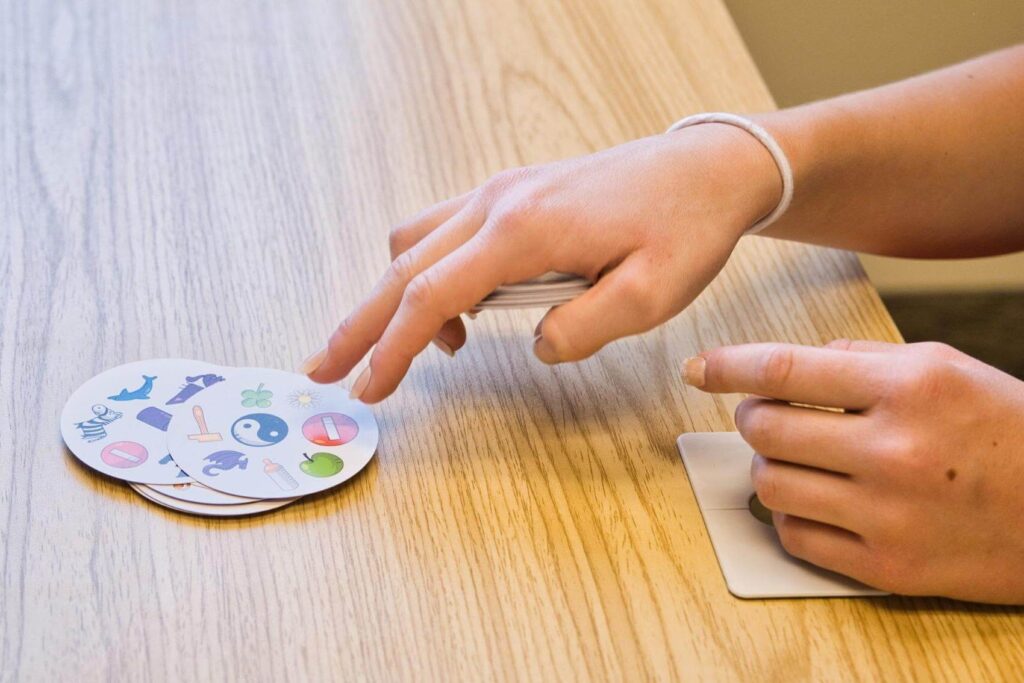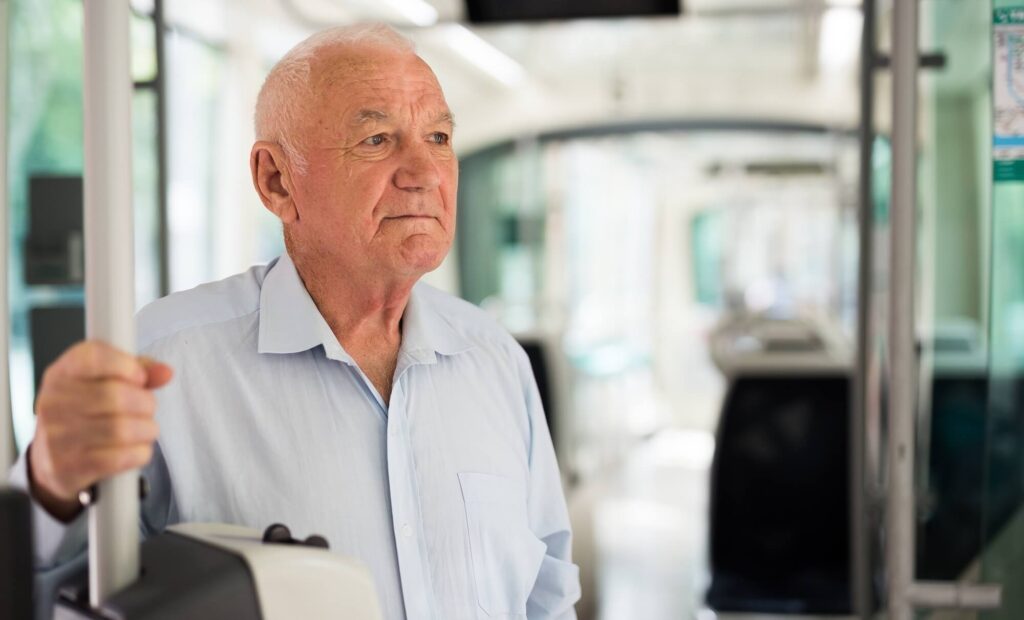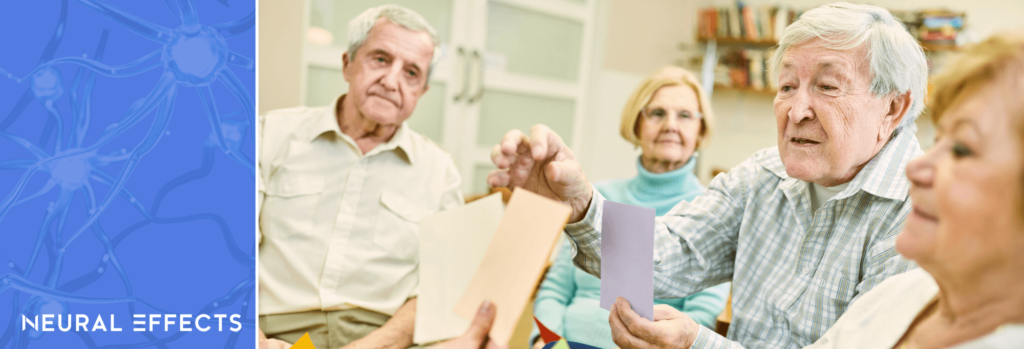Cognitive stimulation therapy (CST) is a form of treatment developed specifically for dementia patients, including patients with Alzheimer’s disease. Sessions are designed to be both fun and cognitively stimulating, helping patients to stave off cognitive decline for as long as possible.
Multiple studies have consistently found positive effects on patients’ cognition, mood, and quality of life. Patients report feeling more relaxed, more self-confident, and more willing to interact with others. The benefits even extend to family members and caregivers, who report a better relationship with their loved ones and a higher quality of life.
At Neural Effects, our therapists further improve the efficacy of CST by leading patients through safe cardiovascular exercises. Aerobic exercise — the kind that gets you sweating and increases your heart rate — helps your brain respond better to therapy and boosts CST’s results. To our knowledge, we are the only clinic in the U.S. offering this powerful combined approach to therapy.
In this article, we’ll cover the following:
- How CST helps dementia patients
- What types of CST are available (and what to expect)
- What to look for in a CST therapist
- Dementia treatment at Neural Effects
- Where you can find CST near you
Neural Effects uses the latest evidence-based techniques to diagnose and help dementia patients. We are located in Provo, Utah and serve anyone in Salt Lake City or the Utah Valley area. We are in network for most types of medical insurance. Schedule your evaluation today.
How Does CST Help Dementia Patients?

Dementia patients have to cope with declining cognitive function, memory loss, behavioral changes, and increased difficulty performing activities of daily living (ADLs). It’s not surprising that they and their loved ones look for ways to fight this decline.
While there are some prescription drugs that help geriatric patients with dementia, they are not suitable for everybody and have a limited effect. Non-pharmacological interventions for dementia are increasingly important for these patients. Cognitive stimulation therapy is one of the better therapeutic options, based on current studies.
CST is the only non-drug treatment recommended by the National Institute for Health and Care Excellence (NICE) and the NHS in the U.K., and the 2011 World Alzheimer’s Report concluded that CST is an evidence-based intervention that should be made available to all patients with mild to moderate dementia.
The “cognitive stimulation” in CST comes from engaging in a range of activities and games that stimulate cognitive functions, such as memory, thinking, and concentration. Typically sessions are held in a small group and also provide opportunities to interact socially with other patients.
Multiple studies and clinical trials show that CST improves quality of life and cognitive function in older adults with dementia and is more cost-effective than anti-dementia drug treatments. This effect appears to be in addition to those of any medication the patient is receiving for dementia. Group sessions provide a safe place to share personal experiences and talk with other dementia patients in a relaxed and supportive environment. Many patients report feeling better about themselves and having more confidence to join in conversations and activities after attending this type of therapy.
Overall, CST can:
- Help with memory and thinking skills
- Slow down the rate of cognitive decline
- Improve quality of life
- Improve language skills and willingness to participate in conversations
- Improve mood and alleviate mental health conditions such as anxiety and depression
- Help with social skills
- Reduce aggressive or challenging behavior
- Help some patients prevent cognitive impairment more when combined with prescription drugs
- Help caregivers manage patients
- Increase opportunities to socialize for caregivers
Many of these studies relied upon the mini-mental state examination (MMSE) as part of their evaluation and analysis.
Types of Cognitive Stimulation Therapy

The original CST was developed specifically to run in a group setting. Since then, other types of CST have been developed and adapted to different situations in dementia care, including virtual sessions during the recent pandemic. Current options include:
- CST in a group setting (the standard approach)
- Individual CST (iCST)
- Maintenance CST (mCST)
- Virtual CST (vCST)
Cognitive Stimulation Therapy (CST) in a Group Setting
Group CST is done over 14 sessions and runs twice weekly over seven weeks. It is administered to small groups comprising fewer than 10 patients. The sessions include themed activities designed to stimulate and engage patients with dementia and provide opportunities for social interaction. Sessions follow a similar structure, but each one has a different theme, with games and activities that cater to the interests of the group.
The atmosphere is friendly and welcoming for all patients. Often, members pick a special name for their CST group or choose a theme song. Also, many groups use orientation boards with information such as the date, location, and name of the group.
Each session follows a theme — which may be childhood events, food, or current affairs — to encourage the patients to engage in a healthy debate. The facilitator plays a vital role in this discussion, ensuring that all members can participate and keeping the conversation on track.
Sessions may also include hands-on activities, such as arts and crafts or baking a cake together, as well as gentle exercises, such as throwing a ball at each other or yoga. The aim is to offer multi-sensory experiences to keep patients active and engaged. Regardless of the theme, CST sessions should be fun and enjoyable for the patients. The opportunity to socialize is just as important as cognitive activities.
CST was adapted from multiple types of therapy developed for dementia patients, including reality orientation therapy and reminiscence therapy.
Advantages
- Cognitive stimulation: Group activities are designed to stave off dementia decline.
- Social interaction: CST sessions encourage patients to meet and talk to the other patients in their group, resulting in the full benefits of CST.
- Getting out of the house: Patients need to get ready and go out to attend CST sessions at their dementia clinic or senior living facilities. This can help them maintain activities of daily living (ADLs).
Disadvantages
- Need transport: Patients rely on family members or carers to take them to the sessions. This may be difficult for some patients.
- Difficulty attending sessions: For patients with poor mobility, attending CST sessions may be a struggle.
Individual Cognitive Stimulation Therapy (iCST)
The use of group CST is growing rapidly in many countries around the world, yet many patients may be unable or unwilling to participate in this type of therapy. It could be because they have restricted mobility or other health issues that stop them from getting out. Other patients may prefer not to participate in group-based activities.
A solution for these patients may involve individual cognitive stimulation therapy (iCST). In this case, sessions are done at home by a caregiver or family member. Importantly, these caregivers receive some training in how to run the sessions and what activities to use.
Not surprisingly, individual CST (iCST) improves the relationship between patient and carer, but its effects on cognitive function are not as clear: Some studies didn’t detect any improvements, while others noticed significant changes, with patients better able to follow conversations, for example.
It’s difficult to determine which patients will benefit more from attending CST sessions at home. Some studies seem to suggest that this therapy works well for patients that were understimulated before therapy. If patients weren’t routinely using their cognitive skills due to a lack of social interactions, then regular activities and games during therapy can translate into health gains.
Overall, patients enjoy the mental stimulation and appreciate activities during the sessions that help them keep in touch with the world around them.
Advantages
- Convenience: Sessions can be done at any time at home.
- Improved relationship with the caregiver: Sessions encourage a close bond between patient and carer.
- Mental stimulation: Patients may experience cognitive improvements, especially if they were understimulated before.
Disadvantages
- Training: Carers need special training to run the sessions.
- Incomplete therapy: It’s common for patients or carers to lose interest and not complete the full set of sessions.
- Lack of interaction: Individual CST sessions don’t provide opportunities to interact with other dementia patients, even though the social interaction is a large piece of CST’s effectiveness.
Maintenance Cognitive Stimulation Therapy (mCST)
After patients complete the first set of CST sessions, they may be offered further treatment. This is called Maintenance Cognitive Stimulation Therapy (mCST).
Maintenance CST includes 24 weekly sessions done after the full CST course. These sessions are structured in a similar way to the initial CST classes, where patients engage in meaningful and stimulating group activities to help maintain memory, language, concentration, and other cognitive functions. Some activities are repeated in every session, such as reminders of the date, time, and place. The sessions provide a fun, supportive environment where people can build new friendships.
Some examples of activities include:
- Discussions
- Word and number games
- Quizzes
- Physical activities
- Creative and musical activities
Research into mCST shows that it can improve thinking abilities and other cognitive functions, general well-being, and quality of life for dementia patients. After therapy, patients noticed significant improvements for up to six months, particularly those patients who were receiving medication for dementia compared to those who just attended CST sessions.
Advantages
- Long term benefits: Patients experience benefits up to 6 months after therapy.
- Better results when combined with medication.
- Improved quality of life
Disadvantages
- No guarantees: Not all patients experience improvements in their cognitive abilities.
Virtual Cognitive Stimulation Therapy (vCST)
During the COVID-19 pandemic, access to in-person interventions like CST were restricted. Not only did this prevent access to services and treatments for dementia patients who were previously using them, but it also highlighted a serious lack of services for those who could not access normal services anyway, such as patients living in rural or isolated communities or those with reduced mobility.
To cover these needs, many health providers adapted to the situation by developing treatments that could be delivered using digital technology. Virtual CST was one example.
Typically, virtual CST sessions involve small groups of patients to ensure they can easily see everybody on screen. Sessions last for about one hour and use CST activities that can be transferred into a digital form. For example, to discuss current affairs, patients can look for online news clips and share them with the group.
Further research is needed, but initial results are promising. Virtual CST can slow down dementia symptom progression, and patients feel more socially engaged and less isolated. They also experience better moods after the sessions and enjoy social interactions more. In fact, virtual sessions have their own advantages. Unlike group CST, with virtual CST, patients don’t have to live in the same area (or even the same country), which could be a point of stimulating conversation for the group, allowing them to learn about different cultures.
On the other hand, low levels of digital literacy and poor access to technology may be barriers to widespread use. In addition, patients attend sessions from home and remain physically separate from the other patients and facilitators. Some patients may struggle to interact with others this way, especially if they suffer from hearing or visual impairments.
Please note that we do not offer vCST at Neural Effects at this time.
Advantages
- Convenience: Attending sessions at home means patients don’t have to travel.
- Familiar environment: Patients attend virtual sessions in a safe and familiar place. This is ideal for frail patients or those who find it difficult to socialize.
- Broader social interactions: Virtual sessions allow patients to talk to other patients and facilitators. These are people who the participant didn’t know before therapy, allowing for enriched conversations from different perspectives.
- Mentally stimulating: Patients engage and use their minds during the sessions. Most patients describe these sessions as enjoyable and want to learn new things.
Disadvantages
- Low levels of digital literacy: Most older patients don’t know how to use computers or tablets and may need help from family members or carers to set up video conferencing.
- Harder to connect to people: Some patients may struggle to connect to the rest of the group during virtual sessions.
- Not suitable for some patients: Patients with hearing or visual impairments may find it difficult to attend virtual sessions. Ideally, these sessions should be adapted for these patients to ensure they’re not excluded. For example, facilitators could offer speech recognition to help those with hearing problems and describe images for patients with poor vision.
What to Look for in a CST Therapist
Some senior living facilities, dementia clinics, day centers, care homes, and outpatient care facilities offer CST programs. CST can be done by psychologists, occupational therapists, speech-language therapists, nurses, and other healthcare professionals specialized in the treatment of dementia patients.
If you’re looking for CST sessions for yourself or your loved one, make sure you look for a licensed, fully qualified professional who has CST training and experience working with people with dementia and their families. At the end of this article, we’ve compiled a list of locations that offer this type of therapy for dementia patients.
Treatment at Neural Effects

Treatment for dementia patients at Neural Effects involves a combination of CST and short sessions of physical exercise to boost the effect of therapy and help delay the progression of dementia symptoms. Neural Effects is one of the few clinics in the U.S. to offer CST sessions.
Before treatment starts, patients undergo a detailed neuropsychological exam (also called a neurocognitive evaluation) to find out how dementia has affected their cognitive skills. Our therapists also assess physical abilities as well as signs of anxiety, depression, or stress. This initial evaluation usually lasts around 2-2.5 hours.
Once we gather the results from all the tests, our therapists write a Cognitive Care Plan (CCP). All patients who are assessed by our team receive a CCP, regardless of whether they choose to follow through with treatment. The CCP includes vital information for the patient, such as results from the initial evaluation, how the disease is likely to progress, and ways to promote family involvement at home.
If patients decide to start treatment with us, sessions typically start with 10-15 minutes of aerobic exercise on a stationary bike or treadmill. This is not part of the original CST but is a vital component of our program at Neural Effects. Physical exercise promotes blood flow to the brain and triggers a phenomenon called post-exercise cognitive boost (PECB). During PECB, the brain increases production of a chemical called brain-derived neurotrophic factor (BDNF), which makes it more responsive to subsequent therapy.
After exercise, patients engage in a range of activities to stimulate thinking and memory, including group discussions, word games, puzzles, music, and creative, practical activities. These CST sessions are delivered by two facilitators.
Once all the sessions are completed, we may refer patients to specialists for further treatment as needed. For example, if a patient is likely to benefit from prescription drugs, we might refer them to a neurologist, or if a patient is showing signs of depression, we might recommend seeing a psychologist. We can recommend resources for occupational therapy, physical therapy, and so on.
Education and support for family members and caregivers is also an important part of our EMPOWER program. Family members can attend the first CST session and then can repeat some of the activities and games at home. Our therapists also share information with family members about lifestyle changes that can help their loved ones, including engaging in regular exercise, eating a healthy diet, and keeping socially active. (We’ve written in more detail about how lifestyle changes and therapies can help dementia patients.) Finally, our therapists can suggest support groups both for the patients and their caregivers.
Neural Effects uses the latest evidence-based techniques to diagnose and help dementia patients. We are located in Provo, Utah and serve anyone in Salt Lake City or the Utah Valley area. We are in network for most types of medical insurance. Schedule your evaluation today.
Where You Can Find Cognitive Stimulation Therapy Near You

Cognitive stimulation therapy is becoming increasingly popular in the U.S. to treat dementia patients. Below is a list of healthcare facilities that offer this type of treatment. As a disclaimer, we do not have a way to assess the quality of these programs; always do your due diligence to ensure a facility you’re considering offers quality treatment. We did not find providers in every state; only states where we found CST providers are included in the list.
You may find other providers by asking your doctor for referrals or asking on social platforms such as Nextdoor. Not all providers have their information on a website indexed by major search engines.
CST in Alabama
- Encore Respite
- Touching Hearts Senior Care (individual CST)
CST in Arizona
CST in California
CST in Colorado
CST in Connecticut
CST in Florida
CST in Idaho
CST in Illinois
CST in Indiana
CST in Kansas
CST in Kentucky
CST in Maryland and the District of Columbia
CST in Massachusetts
CST in Michigan
CST in Minnesota
CST in Missouri
- A.T. Still University of Health Sciences
- Perry County Memorial Hospital
- SLUcare (St Louis University)
- Southeast Missouri State University
- Anthology Senior Living
- Washington University School of Medicine (virtual sessions)
CST in Nevada
CST in Ohio
CST in Oregon
CST in Pennsylvania
CST in Texas
CST in Utah
CST in Virginia
CST in Washington
In addition, some LifeSpace communities offer CST, but not all. You can reach out to the individual facility to determine if they offer CST.
- Florida – Abbey Delray (Delray Beach)
- Florida – Village on the Green (Orlando)
- Illinois – Oak Trace Senior Living
- Minnesota – Friendship Village of Bloomington
- Pennsylvania – Friendship Village of South Hills
- Texas – Edgemere (Dallas)
- Texas – Meadow Lake (Tyler)
- Texas – Querencia (Austin)
- Texas – The Stayton (Fort Worth)
Neural Effects uses the latest evidence-based techniques to diagnose and help dementia patients. We are located in Provo, Utah and serve anyone in Salt Lake City or the Utah Valley area. We are in network for most types of medical insurance. Schedule your evaluation today.
Note: The references used in our infographic are as follows:
1. Spector, A., et al (2003). Efficacy of an evidence-based cognitive stimulation therapy programme for people with dementia: Randomised controlled trial. The British Journal of Psychiatry, 183(3), 248-254.
2. Chapman, S., at al. (2004) Effects of cognitive-communication stimulation for Alzheimer’s disease patients treated with donepezil. J Speech Lang Hear Res, 47: 1149-63.
3. Aguirre, E. et al. (2012) Cognitive stimulation therapy (CST) for people with dementia–who benefits most? Int J Geriatr Psychiatry, 28:284-90.
4. Saragih, I. et al. (2022) Effects of cognitive stimulation therapy for people with dementia: A systematic review and meta-analysis of randomized controlled studies. Int J Nurs Stud, 128:104181.
5. Lobbia, A. et al. (2018) The efficacy of cognitive stimulation therapy for people with mild-to-moderate dementia. European psychologist, 24: 257-277.
6. Aguirre, E. et al. (2013) Cognitive stimulation for dementia: a systematic review of the evidence of effectiveness from randomised controlled trials. Ageing Res Rev, 12:253-62.
7. Spector, A. et al. (2011) The impact of Cognitive Stimulation Therapy groups on people with dementia: views from participants, their carers and group facilitators. Aging Ment Health, 15:945-9.
8. Bailey, J. et al. (2017) An evaluation of Cognitive Stimulation Therapy sessions for people with dementia and a concomitant support group for their carers. Dementia (London), 16:985-1003.
